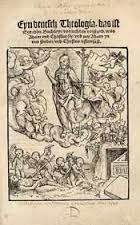 One of the major sources of inspiration for the early Martin Luther was the anonymous work Theologia Germanica or Deutsche Theologie, probably from the 14th century.
One of the major sources of inspiration for the early Martin Luther was the anonymous work Theologia Germanica or Deutsche Theologie, probably from the 14th century.
Luther, who gave the writing its name (Eyn deutsch Theologia), produced a partly edition in 1516, and a more full edition in 1518. Luther expressed his high views of the Theologia Germanica, by placing it just after the Bible and Augustine: “Next to the Bible and St. Augustine, no book has ever come into my hands from which I have learned more of God and Christ, and man and all things that are.”
After its publication by Luther the work gained much attention and inspired many adherents of the radical reformation, especially South German spiritualists such as the Anabaptist Hans Denck, and later Pietism. The work does not claim an explicit eschatological universalism, but its motif of ‘hell’ and the soul’s experience of being lost as a station on the path to salvation, rather than a final destination, is an important element in many kinds of later Restorationism – perhaps most notably in Klein-Nicolai’s The Everlasting Gospel, Elhanan Winchester, and Andrew Jukes.
This important notion of being saved through the experience of damnation is what has also been called resignatio ad infernum. This theme is worked out in the Theologia Germanica as the human self is said to be unable of doing any good in and of itself. In order to be saved, the human self must be broken down in a spiritual hell where it is deprived of all hope, and as a result is made to turn to God.
”Christ’s soul must needs descend into hell, before it ascended into heaven. So must also the soul of man. But mark ye in what manner this cometh to pass.
When a man truly Perceiveth and considereth himself, who and what he is, and findeth himself utterly vile and wicked, and unworthy of all the comfort and kindness that he hath ever received from God, or from the creatures, he falleth into such a deep abasement and despising of himself, that he thinketh himself unworthy that the earth should bear him, and it seemeth to him reasonable that all creatures in heaven and earth should rise up against him and avenge their Creator on him, and should punish and torment him; and that he were unworthy even of that.
And it seemeth to him that he shall be eternally lost and damned, and a footstool to all the devils in hell, and that this is right and just and all too little compared to his sins which he so often and in so many ways hath committed against God his Creator.
And therefore also he will not and dare not desire any consolation or release, either from God or from any creature that is in heaven or on earth; but he is willing to be unconsoled and unreleased, and he doth not grieve over his condemnation and sufferings; for they are right and just, and not contrary to God, but according to the will of God.
Therefore they are right in his eyes, and he hath nothing to say against them. Nothing grieveth him but his own guilt and wickedness; for that is not right and is contrary to God, and for that cause he is grieved and troubled in spirit.
This is what is meant by true repentance for sin. And he who in this Present time entereth into this hell, entereth afterward into the Kingdom of Heaven, and obtaineth a foretaste there of which excelleth all the delight and joy which he ever hath had or could have in this present time from temporal things.
But whilst a man is thus in hell, none may console him, neither God nor the creature, as it is written, “In hell there is no redemption.” (Ps 49:8) Of this state hath one said, “Let me perish, let me die! I live without hope; from within and from without I am condemned, let no one pray that I may be released.”
Now God hath not forsaken a man in this hell, but He is laying His hand upon him, that the man may not desire nor regard anything but the Eternal Good only, and may come to know that that is so noble and passing good, that none can search out or express its bliss, consolation and joy, peace, rest and satisfaction.
And then, when the man neither careth for, nor seeketh, nor desireth, anything but the Eternal Good alone, and seeketh not himself, nor his own things, but the honour of God only, he is made a partaker of all manner of joy, bliss, peace, rest and consolation, and so the man is henceforth in the Kingdom of Heaven.
This hell and this heaven are two good, safe ways for a man in this present time, and happy is he who truly findeth them. For this hell shall pass away, But Heaven shall endure for aye.
Also let a man mark, when he is in this hell, nothing may console him; and he cannot believe that he shall ever be released or comforted. But when he is in heaven, nothing can trouble him; he believeth also that none will ever be able to offend or trouble him, albeit it is indeed true, that after this hell he may be comforted and released, and after this heaven he may be troubled and left without consolation. Again: this hell and this heaven come about a man in such sort, that he knoweth not whence they come; and whether they come to him, or depart from him, he can of himself do nothing towards it.
Of these things he can neither give nor take away from himself, bring them nor banish them, but as it is written, “The wind bloweth where it listeth, and thou hearest the sound thereof,” that is to say, at this time present, “but thou knowest not whence it cometh, nor whither it goeth.” (Jn 3:8) And when a man is in one of these two states, all is right with him, and he is as safe in hell as in heaven, and so long as a man is on earth, it is possible for him to pass ofttimes from the one into the other; nay even within the space of a day and night, and all without his own doing.
But when the man is in neither of these two states he holdeth converse with the creature, and wavereth hither and thither, and knoweth not what manner of man he is. Therefore he shall never forget either of them, but lay up the remembrance of them in his heart.” (Theologia Germanica §XI, p. 35)
